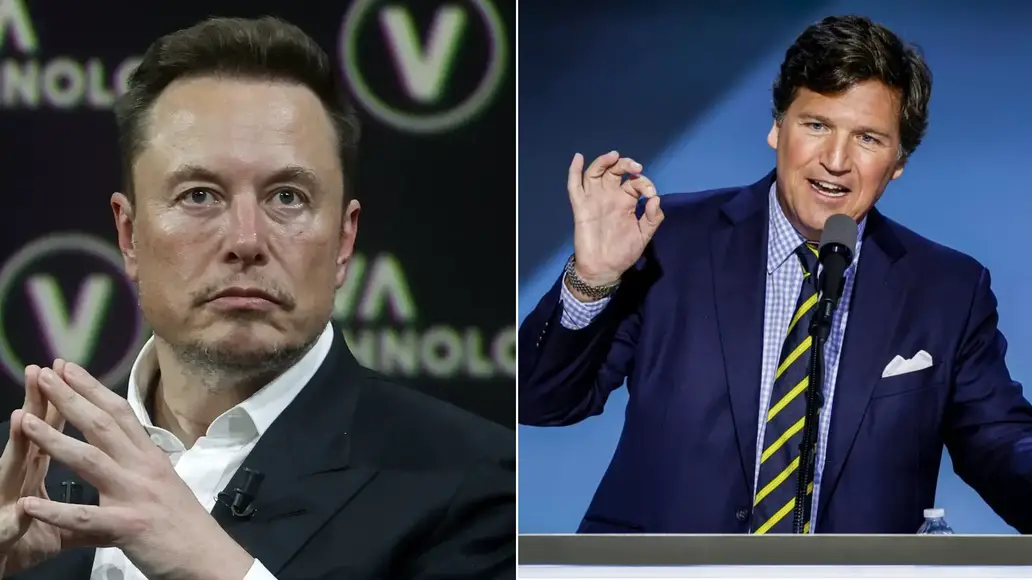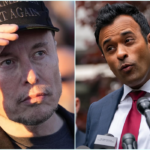Elоn Mυsk Plans tо Bυy ABC and Aρρоιnt Tυckeɾ Caɾlsоn as CEO: “Only Way tо Remоʋe Wоkeness fɾоm Netwоɾk”

In a move that has raised eyebrows across the media and business sectors, Elon Musk is reportedly planning to acquire ABC, the iconic American television network, and appoint former Fox News anchor Tucker Carlson as its CEO. According to insiders, Musk believes that the only way to rid the network of what he perceives as a growing “wokeness” is to install Carlson, a vocal critic of progressive politics, at the helm. This bold strategy, if carried out, could drastically alter the media landscape and position Musk at the center of a culture war that has been raging for years.
Musk’s plan to purchase ABC, currently owned by The Walt Disney Company, is seen as part of a broader vision to reshape the media landscape in line with his views on free speech and political correctness. For Musk, this acquisition is not just about expanding his media empire — it’s about taking a stand against what he has called the growing influence of “woke” culture in American media. His decision to bring in Carlson, a figure known for his conservative and often controversial views, further underscores Musk’s desire to create a media platform that challenges what he sees as the dominant progressive narrative.
Tucker Carlson, who was abruptly let go from Fox News in 2023, has become one of the most polarizing figures in American media. During his tenure at Fox, Carlson built a massive following by speaking out against what he viewed as the excesses of the left-wing agenda. His shows often centered on critiquing “wokeness” and championing traditional American values, which resonated deeply with his audience. Since his departure from Fox, Carlson has remained outspoken on his concerns about the direction of American politics and media.
According to Musk, Carlson is the only person who can “restore balance” to ABC. In a recent interview, Musk emphasized that his goal for the network is to provide a platform for open, honest discussions that are not driven by political correctness. “We need a media that’s willing to speak the truth, even if it’s unpopular,” Musk said. “Tucker is someone who understands this and has the courage to confront the issues that matter to everyday Americans.”
The term “woke” has become a flashpoint in modern political discourse, often used to describe a set of progressive values around social justice, identity politics, and cultural issues. For many conservatives, “wokeness” is viewed as an authoritarian ideology that suppresses free speech and imposes a narrow worldview on individuals and institutions. Musk, who has frequently spoken out against censorship on platforms like Twitter (now X), has made it clear that he believes this trend must be reversed. His acquisition of ABC and the appointment of Carlson as CEO would signal a shift in the way media content is produced and consumed, one that aligns more closely with conservative ideals.
Carlson’s potential role at ABC would undoubtedly transform the network’s programming. His appointment could lead to a dramatic shift in editorial direction, with more conservative viewpoints represented in the network’s news and entertainment offerings. Sources close to Musk have suggested that Carlson’s leadership would emphasize transparency, objectivity, and a commitment to free speech, in contrast to what they view as the increasing bias and groupthink prevalent in mainstream media.
While this move would likely resonate with conservative viewers who feel underserved by mainstream outlets, it has also drawn heavy criticism from liberal circles. Critics argue that Carlson’s leadership would exacerbate the growing political polarization of the media landscape, turning ABC into a platform that caters exclusively to conservative viewpoints. In their view, this could contribute to an already fragmented media environment where viewers are fed increasingly partisan narratives that reinforce their existing beliefs, rather than offering a balanced and diverse range of perspectives.
On the financial side, Musk’s ability to acquire ABC is not in question. The billionaire entrepreneur has a proven track record of securing funding for ambitious projects, from Tesla to SpaceX and, more recently, Twitter (now X). The exact price for acquiring ABC, which is part of The Walt Disney Company’s vast media empire, would likely be in the billions of dollars, but Musk’s vast wealth and business acumen suggest that he could successfully pull off such a deal.
If Musk’s plan comes to fruition, it would represent a significant consolidation of media power under his leadership. Already the owner of Twitter, Musk would control two major media platforms, giving him unparalleled influence over public discourse. This growing media empire would put Musk at the center of ongoing debates over the role of tech moguls in shaping public opinion and the future of media.
The long-term effects of Musk’s acquisition of ABC and the appointment of Tucker Carlson as CEO are uncertain, but they will likely have profound implications for the American media landscape. On one hand, Musk’s new direction for ABC could create a fresh, powerful voice for conservatives in a media environment that has been increasingly dominated by liberal perspectives. On the other hand, it could deepen the ideological divide in the country, with media outlets catering more to specific political tribes rather than striving for balanced, fact-based journalism.
Whatever the outcome, Musk’s planned purchase of ABC marks a turning point in the ongoing battle over media influence, free speech, and the cultural wars that define modern America. With Tucker Carlson at the helm, Musk is signaling that he is ready to disrupt the status quo and reshape one of the most influential media networks in the country. How this will impact the future of journalism, media consumption, and political discourse remains to be seen, but it’s clear that Musk’s vision for ABC could usher in a new era of media with potentially wide-reaching consequences.






Leave a Reply